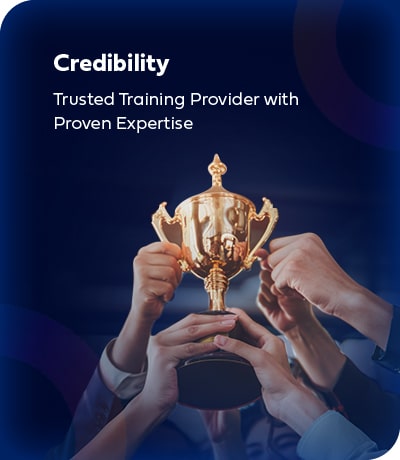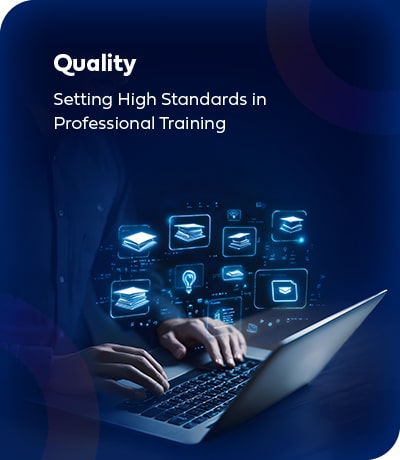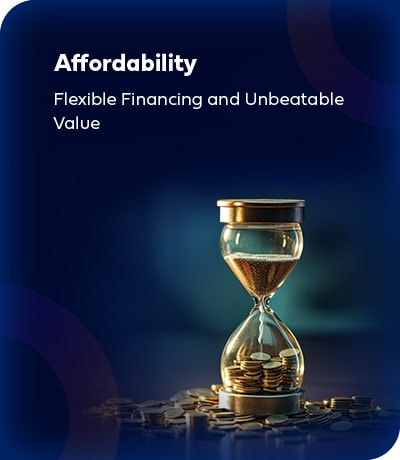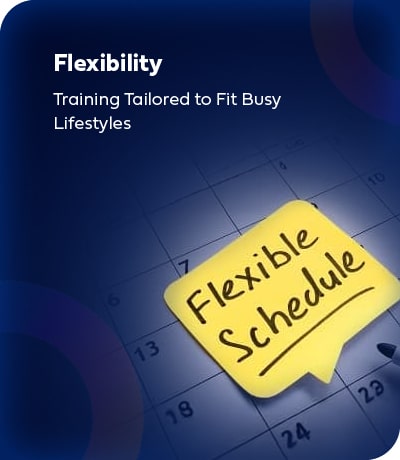
Online Course
Start learning immediately
1,039 Students enrolled
Price Match
Guarantee

3 months instalments of: £398.33
6 months instalments of: £199.17
9 months instalments of: £132.78
12 months instalments of: £99.58

Take your first steps towards becoming a successful finance professional with a CIMA qualification.
The CIMA Operational Level is the starting level of the CIMA's CGMA Professional Qualification, which equips you with a strong understanding of how management accountants use financial information to support business decisions and short-term strategies. Completing this CIMA Professional Operational Level positions you for finance roles such as Cost Accountant, Financial Accountant, Management Accountant, Budget Analyst, Finance Analyst, and more.
Our CIMA Professional Operational Level training course will teach you the fundamental knowledge and skills to progress your business finance or accounting career.
If you have relevant qualifications or experience and desire to gain the CGMA designation, this CIMA Operational Level course is your key to becoming a Chartered Global Management Accountant!
Upon completing the qualification, you'll be awarded the designatory letters, CIMA Dip MA, by the leading institute for management accountants worldwide, the Chartered Institute of Management Accountants (CIMA).
Our CIMA Operational Level online course offers you the following:
Access to industry-leading eLearning platform.
CIMA-approved training course materials.
Support from award-winning, industry-expert Tutors.
A collection of digital resources.
Kaplan physical study books.
Interactive course content.
Interest-free payment options.
Best price guaranteed on like-for-like courses.
Support from an organisation that has trained over 630,000 students.
If you've already completed the CIMA Operational Level, you can take our CIMA Management Level course to help you improve your professional recognition in this field.
We also provide all three CIMA Professional qualification levels in our CIMA Professional Qualification course package so you can fully commit to your CGMA journey and receive ongoing support from us from start to finish.
CIMA Operational Level is the starting level of the CGMA Professional Qualification, providing you with the necessary knowledge, tools, and techniques to support short-term decision-making on an operational level of the organisation. Our course provides comprehensive support to help you master these three subjects and pass all your exams.
Managing Finance in a Digital World (E1)
Managing Finance in a Digital World represents the Enterprise pillar of the CGMA Professional Qualification. This subject provides a comprehensive understanding of the importance of finance in an organisation and the technologies that shape it in an ever-growing digital landscape.
You'll learn how to leverage technology to collect, process, analyse, assess, store, and use the data to help you make informed financial decisions.
Some of the expected learning outcomes for this subject are the following:
Learn the central role that finance plays in an organisation and how and why technologies are used to impact the finance function.
Learn how to use and examine data collected and processed by machines to create and preserve value for organisations.
Find out how the finance function is structured and shaped and how it interacts with other parts of the organisation to achieve the objectives of the whole organisation.
For this subject, the key concepts that you'll learn are:
Role of the finance function.
Technology in a digital world.
Data and information in a digital world.
Shape and structure of the finance function.
Finance interacting with the organisation.
Management Accounting (P1)
Management Accounting represents the Performance pillar of the CGMA Professional Qualification. The subject delves into the core concepts of management accounting and how it supports your short-term strategic decision-making.
You'll learn to utilise the tools and techniques that help you analyse financial data and translate them into actionable insights you can implement within your organisation.
Some of the expected learning outcomes for this subject are the following:
Find out why and what costing is used for, including appropriate costing methods and techniques and where digital costing might be used.
Learn how budgets are prepared and implemented across the organisation and the impact these have.
Using appropriate risk management tools, learn how techniques are applied to ensure sound short-term decision-making against risk and uncertainty.
For this subject, the key concepts that you'll learn are:
Cost Accounting for decision and control.
Budgeting and budgetary control.
Short-term commercial decision-making.
Risk and uncertainty in the short term.
Financial Reporting (F1)
Financial Reporting represents the Financial pillar of the CGMA Professional Qualification. This subject equips you with the knowledge and expertise in preparing financial reports for internal and external users.
You'll master how to create accurate, reliable, and compliant financial reports that you can use to make informed business decisions, manage performance, and manage other internal uses in the organisation.
Some of the expected learning outcomes for this subject are the following:
Identify the regulators, what they do, why, and how regulations are applied.
Learn how to prepare basic financial statements using financial reporting standards.
Find out how to distinguish between types of taxes, calculate corporation taxes and issues affecting taxation.
Discover what tools are used to ensure the organisation has enough cash for ongoing operations.
For this subject, the key concepts that you'll learn are:
The regulatory environment of financial reporting.
Financial statements.
Principles of taxation.
Managing cash and working capital.
Format
CIMA Professional Operational Level requires you to pass three objective tests and a case study exam before earning the qualification.
The objective tests are multiple-choice and computer-based and assess all component learning outcomes you have covered in this course. The case study exam is also computer-based and covers all the knowledge, skills, and techniques across the three subjects and assesses how you apply them to real-world situations.
Duration
Below are the duration for each exam at this level:
Managing Finance in a Digital World (E1): 90 minutes.
Management Accounting (P1): 90 minutes.
Finance Reporting (F1): 90 minutes.
Case Study Synoptic Exam: 3 hours.
Availability
All exams from this level are available via the awarding body and can be taken at 5,500 Pearson VUE centres across 178 countries worldwide. You can take the objective exams on demand, while the case study is only available in four windows throughout the year. We'll provide you with all the support and resources you need to prepare for your exams.
You'll need an active student subscription to sit your exams. Annual student subscriptions and exam fees are separate from the course price.
Objective tests are computer-marked, so you'll receive your provisional results within 48 hours. Case study, on the other hand, is human-marked, so it'll take 6 to 8 weeks before you can receive the results from this exam.
The CIMA Professional Operational Level is aimed at finance professionals interested in specialising in management accounting. Anyone with the relevant qualifications or experience in the industry can enrol in this course and take the first step in their CGMA journey.
To study the CIMA Professional Operational Level, we recommend that you:
Have achieved the CIMA Certificate in Business Accounting, AAT Level 4 Accounting, or equivalent qualification from an accredited awarding body.
Have an interest in undertaking the CGMA Qualification journey.
Have a solid understanding of the English language.
Are comfortable with basic mathematics.
Have access to a PC or laptop (This course is compatible with both Mac and Windows).
While this qualification is delivered online, we also include the textbooks to assist you with your studies.
Most comprehensive course training at the most affordable price.
Professional qualification: Upon completing the operational level, earn your CIMA Dip MA designation, which will boost your employability and credibility to employers and businesses in the finance industry.
Comprehensive eLearning platform: Access an industry-leading eLearning platform with all the support and learning materials you need and a user-friendly interface for easy navigation.
Responsive Tutor support: Request unlimited support from award-winning Tutors who aim to assist you with your learning and respond to you within 24-48 hours.
Interactive course content: Our interactive course content, consisting of engaging slides, videos, animations, and more, can help you engage with the lessons better.
Exam preparation materials: Better prepare for your CIMA examinations with our exam preparation materials.
Flexible learning: Study independently with 12 months of course access, available when and where it suits you best.
Physical study books: Gain additional learning insights as we provide you with CIMA-accredited textbooks to match your learning preferences.
Interest-free payment options: Our interest-free payment options make your education more accessible so you can study the course and start your learning journey without worries.
Available CIMA courses: Continue learning with our wide range of CIMA training courses.
TOTUM Pro Card: Shop with discounts using TOTUM Pro Card, which offers discounts in selected stores and websites.
How valuable is a CIMA qualification?
A CIMA qualification is an excellent addition to your professional toolkit.
Its awarding body, the Chartered Institute of Management Accountants, is the most prominent professional body for Management Accountants that is recognised by employers, with 96% of FTSE 100 firms employing CIMA-qualified individuals.
CIMA qualifications are worth earning because you'll gain essential skills and professional recognition that open up career opportunities across different countries and industries. Graduates enter the industry with access to various opportunities, including Finance, Consultative, and Management roles.
What is a CIMA Professional Qualification equivalent to?
Completing all levels of CIMA Professional Qualification and earning the CGMA designation is equivalent to a Master's Degree or Level 7 qualification, demonstrating a high level of knowledge, skills, and commitment to management accounting.
Is CIMA qualified as a Chartered Accountant?
After completing the CIMA Professional Qualification, you'll be awarded the designatory letters, ACMA and CGMA, and become a respected Chartered Management Accountant in the finance sector. Chartered Management Accountants specialise in the management accounting field, where they play a vital role in providing financial information and analysis to support business decision-making.
How difficult is CIMA Operational Level?
The CIMA Operational Level may have challenging assessments and case study examinations, but with the right support and resources, you can pass all exams and continue working towards the coveted CGMA designation.
At e-Careers, our comprehensive CIMA Operational Level course training will provide you with all the support you need for this level.
How many papers are there in CIMA Operational Level?
CIMA Professional Operational Level has three objective tests and a case study exam that you must pass before earning the qualification. Each objective test is computer-based, has a multiple-choice format, and will have an exam duration of 90 minutes. Meanwhile, the case study synoptic exam is also computer-based and will have an exam duration of 3 hours.
What should I do next after I have completed the CIMA Operational Level?
After completing the Operational Level of CIMA Professional Qualification, you'll gain the designatory letters, CIMA Dip MA, which you can use in your professional career. You're also become eligible to take the next level of the qualification, CIMA Professional Management Level.
What jobs can I apply for after my CIMA Operational Level?
After achieving your CIMA Operational Level, you will gain the designatory letters CIMA Dip MA. While studying for the CIMA Management Level, you can apply for entry-level finance professional roles, such as:
Finance Officer
A Finance Officer works across financial management, often supporting budget preparation, financial reporting, and analysis.
Budget Analyst
A Budget Analyst plans and analyses the organisation's budget, ensuring its resources are allocated efficiently and strategically.
Cost Accountant
Cost Accountants analyse and allocate the business' costs to optimise resource efficiency and profitability.
Finance Analyst
Financial analysts research and analyse financial data to guide businesses and individuals in their investment and financial decisions.
Management Accountant
A Management Accountant conducts thorough financial analysis and applies accounting principles to support organisational leaders in decision-making.







